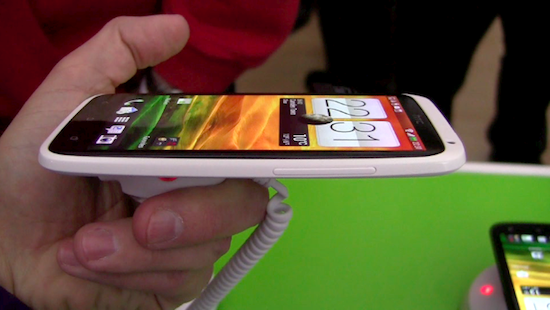
Since the dawn of Android, Samsung and HTC have been back and forth in a battle for the spot as top manufacturer for the little green robot. Until last year, the two have been virtually neck and neck, judging by sales and loyal customer support. Some would argue that HTC was the king of Android after they bombarded the market with some of the most high-end phones we had ever seen: the HTC EVO 4G, Nexus One, DROID Incredible, etc. Yet Samsung fired right back with their ever-popular Galaxy S series.
Throughout last year, however, Samsung edged out HTC for the top spot. While HTC started to stray from their roots and continued to release too many stepping stone devices with their own partially fragmented custom version of Android, Sense UI, Samsung stole the crown and a vast majority of consumers' attention with their Galaxy S II devices. Nearly all of Samsung's most recent devices have been extremely successful around the world; they have sold over 5 million Galaxy Notes and north of 20 million Galaxy S II phones worldwide.
We knew it would only be a matter of time before HTC fired back, however. Being the crowd favorite for so long, they weren't going to simply walk away and let Samsung best them. They vowed not only to create fewer devices moving forward, focusing more on the quality of each individual device instead of simply churning out new phones for the sake of it, but they also promised to "de-clutter" Sense UI.
As we learned at Mobile World Congress in late February, HTC's attempt to win back customers comes with a single, structured line of phones: One. There are three devices within the line-up, the One X, One S and One V. The One X is the high-end device, while the One S and One V are more mid-range devices.
When we first learned about the One phones our impressions were that this would be an awesome turning point for HTC. Everything looked good on paper and the devices' designs were reminiscent of some of HTC's best devices of yesteryear -- like the Nexus One, for instance. It seemed as if HTC had made a major breakthrough, listening to some of their most loyal customers' complaints and addressing some of the largest outstanding issues.
Truth be told, though, I have been very skeptical about the One devices so far. I have been excited over several HTC devices many times before, only to be let down. (HTC ThunderBolt, anyone?) And, as many of you know, a device's camera quality carries a lot of weight for me. After some questionable sample shots with a One camera from HTC's blog, I sort of lost interest and faith in the One series.
Early this morning, however, a few embargoes lifted and HTC One X and One S reviews flooded the Web. Our own Aaron Baker has been using the One X and One S for roughly a week and both of his full video reviews went live today. After watching all four of his videos and a handful of others, along with a couple written reviews, I have to admit that I'm actually pretty impressed with HTC. Sense UI, while it's still a complete revamp of stock Android, appears to be much more lightweight and quick. The Tegra 3 and Snapdragon S4 seem to have worked without a hitch and with no noticeable lag. The 720p and qHD displays look absolutely fantastic (color-wise, at least). And so on and so forth. All seems well. Great, even.
What really stuck out to me, though, is how Aaron reached out to me and told me he really thinks I would like the One X. If anyone knows my preferences and frustrations in devices better than anyone else, it's probably Aaron. And I trust his judgement. He doesn't normally go out on a limb and say he thinks I might like something. So for him to say that to me, it speaks volumes for how HTC has improved the quality of their devices.
Still, I'm not totally convinced I will like Sense 4 or ImageSense (the One cameras). I never like to judge something before I get some hands-on time with it and I have yet to play with any of the One series. That should change over the next couple of days. Here's to hoping they're as good as HTC says and as good as I want to believe they are.
What's truly surprising, though, is the amount of attention HTC received today. It's been a long time since there has been a splash this big about an HTC device. The question now is: can HTC reclaim their title as Android king in 2012 with the One series?
Obviously, that hinges on what the Galaxy S III entails and whether we will see a successor to the strangely popular Galaxy Note. But, for the first time in a long time, Samsung really has their work cut out for them. Personally, I believe the Galaxy S III will be a victim of its own hype.
Either way, the competition is really heating up this year. Who will be Android king in 2012? HTC? Samsung? Motorola?